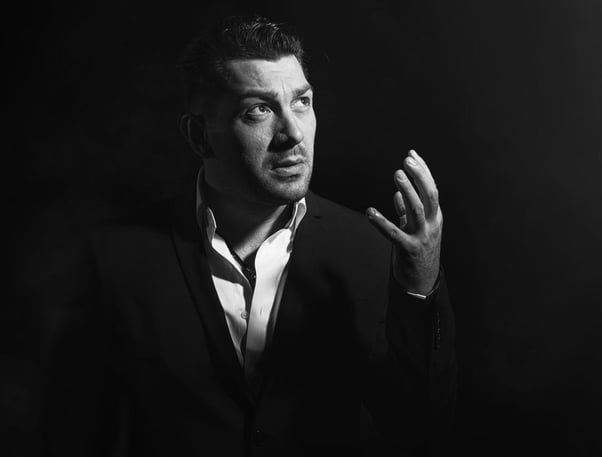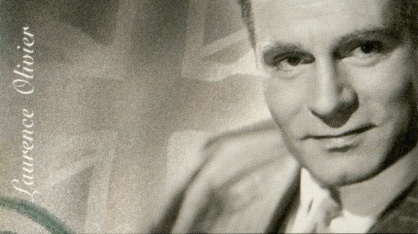
Can you command a stage when you deliver a speech? Discover these actor's secrets for how to be a great public speaker!
What constitutes great public speaking? It's the marriage of strong material and a powerful stage presence, isn't it?
If that sounds like the definition of both a speech and an acting performance, it's no mistake.
Can you achieve a match made in heaven when you speak: vital content combined with a dynamic performance? Learn how in my free Insights article, "Great Speaking? — It's About Performance Over Content!"
That's exactly why my work at The Genard Method uses performance-based tools for public speaking training: the techniques of the theater are the ones you need to reach and move audiences. Below are four ways in which the worlds of acting and speaking merge. Speak from this place, and you won't come across as someone else—just you performing at your very best.

Learn How to Thrive in the Oral Arena
Most speakers make a fundamental mistake in the run-up to a talk: they spend all of their time in the literary world. And no wonder. Our education and even on-the-job training don't raise our awareness of—nor provide us with the skills for—the oral arena where our speeches and presentations take place.
Think of the words we use: 'talk,' 'speech,' 'present,' 'remarks'—they all presuppose a speaker, a place (conference room, stage, auditorium, etc.), and an audience in attendance. What you do in this venue, how you do it, and the effect it has on listeners—these are the elements of the public speaking situation. If you spend all of your time putting notes and PowerPoint slides together, and don't get on your feet to practice, and speak as frequently as you can, how can you be comfortable in front of an audience?
Call it a mindset: think in terms of your eventual performance from the moment you know you'll be speaking in public. Start this way: write something down only after you've said it aloud and heard for yourself whether it succeeds with the ear not the eye.

Treat Your Stage as a Performance Space
With your mind now in the right place (and your content shaped for the ears of listeners), you're ready to enter the performance space. That space can be your position standing at a conference table during a meeting, up to a TED-sized stage: it doesn't matter. Whatever physical place you occupy as a speaker, that is where you command the stage.
And you must fill that space. As a speaker, you're the leader, and you must energize the room. I'm talking here about the physical expression of your message, of course, but not completely. Your energy level, sense of pace and drama, your willingness to go big or small, bold or intimate as you share yourself with your audience, all come into play.
But about that need for physical expression: Your body is one of your most important communication tools (which is why we call it "body language"), and you must use it. What you show an audience tells them things, quite apart from what your content is communicating. Their response goes right to your credibility, legitimacy, believability, and ability to lead. When you perform with poise and power, something happens that goes far beyond a static presenter reading his or her content. That's valuable, but it can't touch an emotionally affecting event.

Enjoy a Love Affair with Your Audience
Your audience is everything, and you must deliver what you have to say with their needs in mind. It's called 'giving' a speech, isn't it? What you have to offer is a great gift. And of course, the value lies in what it does for the receiver not the giver.
Think of the last dozen presentations you've listened to and ask yourself this question: How many of these speakers poured themselves out for their audiences—giving everything they had, as a great actor does—versus the speakers who were in love only with their material, or worse, themselves? In particular, watch those who artificially gin up excitement in star-turns that are beautifully calculated, overly smooth, and empty of empathy and true feeling.
You have to be in love with your listeners. And everything that you prepare beforehand and deliver in your actual performance must be about them. I call it living in the world of your audience. And here's the interesting thing: if you forget yourself this way, lending all your energy to getting through to the people you're talking to, you'll achieve the public speaking acclaim you're hoping for. In other words, you can't achieving excellence by aiming directly for it. Your target has, instead, to be truth. It's exactly the same dynamic (and paradox) that actors embrace.
 Why 'I Don't Know How I Did' Is the Right Response
Why 'I Don't Know How I Did' Is the Right Response
There's a story of the famous 20th-century actor Laurence Olivier that perfectly sums up this matter of forgetting yourself to find greatness in your performance. Olivier was playing Othello at Britain's Old Vic theater in 1964. When the final curtain came down, thunderous applause testified to how he had done in the role.
Upon leaving the stage, the cast honored him with applause. But Sir Laurence was unhappy. "I don't know what I did," he said. "How can I do it again?"
His reply, of course, is exactly why he would be able to do it again the following night, and every night thereafter. He gave up himself for the sake of the character he portrayed. In each moment of the play—as that character spoke, was spoken to, and reacted to the plot—the one who responded was Othello, not Laurence Olivier. That is, he was playing the truth of the moment, not the "excellence" he clearly could achieve when he wanted to.
Your own speech is your opportunity—your duty—to serve the truth your audience needs. And if someone asked you afterward, "How do you think your appearance went?"; your answer, "I don't really know," would be the right one.
You should follow me on Twitter here.



